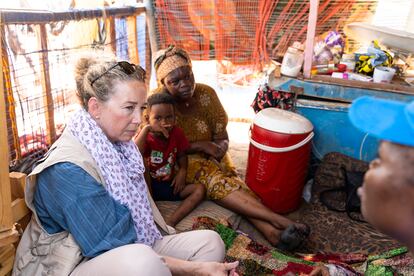‘We shouldn’t have to choose between helping a South Sudanese person, a Ukrainian or an Afghan’
Dominique Hyde, the U.N. Refugee Agency’s director of foreign relations, says the humanitarian crisis resulting from the war in Sudan is the worst she’s seen in three decades


There are so many places in the world in need of help. Palestine, Ukraine, Afghanistan, Syria, Venezuela and Myanmar, to name a few, are just some of the hardest-hit corners of the planet, where at least 108.4 million people have had to flee their homes over the last year due to war, poverty and hunger, ethnic or religious persecution, or from natural disaster.
Of all these emergencies, there is one that is especially dire due to its severity, but also its anonymity: the war that started seven months ago in Sudan that has transformed the country, which is now home to the world’s largest number of forcibly displaced individuals. That figure could be as high as seven million, of whom 263,000 have crossed the border into South Sudan, a nation already dealing with extreme poverty that is trying to shore up a peace still elusive after 10 years of internal conflicts.
As the director of foreign relations of the United Nations Refugee Agency (UNHCR), Dominique Isabelle Hyde (Ottawa, 51 years old) visited the South Sudanese city of Renk at the beginning of November. It is the epicenter of refugees, where 10,000 people arrived during the three days of her visit alone. Since then, and on the brink of leaving for another foray into neighboring Sudan, Hyde says that this is the worst human tragedy that she’s seen in her 30-year career.
Question. There are multiple humanitarian emergencies in the world, and among them all, you have decided to focus on South Sudan. Why?
Answer. In the first place, it’s one of the worst emergencies that this part of the world has seen in a long time. And we’re seeing that it’s being given no attention. It’s not the same type of response that we’ve seen offered toward the war in Ukraine, or even Afghanistan. We are very concerned. Right now, our appeal to the global community has only been 40% funded. This means that we are not capable of responding to the growing number of refugees and displaced individuals.
Q. What part of this situation has most impacted you?
A. I’ve been doing this work for 30 years. I have worked for many of the U.N.’s agencies, and what surprises me is how many people have been affected. Yesterday more than 3,000 people crossed the border to enter the country, and that happens every day. Renk’s transit center long ago passed its capacity limit. What I saw today is a center that was originally planned to be used for only a few days that is packed with people and whose situation health-wise is deeply troubling, especially when we know that there is a cholera outbreak on the other side of the border in Sudan. Of course, its teams are doing everything they can, but the challenge is twofold. For one, they must be able to provide sufficient refuge to these communities, but we don’t have the necessary funding, and neither do any of the non-profits with whom I’ve met, or the other U.N. agencies. The second challenge is the impact, which we’ve been seeing since mid-August, of not being able to transport people from the transit center to the refugee camps or their homes, for those who are sent back. The roadways have been completely devastated by recent heavy rains. The country hasn’t seen such flooding in 60 years.
Q. What is most urgent, right now?
A. We need to give refuge urgently, we need to be able to supply it. I’ve seen many people with nowhere to sleep, covered only by plastic sheets. They even use their own dresses, just to have a roof. I’d also say, water and sanitation. There’s not enough water, there’s no good sewer system, and that facilitates the spread of infectious disease. And then, of course, food. But not just here: once we bring the South Sudanese back to their homes, they will also need to receive these kinds of support.
Q. You mentioned that UNHCR has only received 40% of the necessary funding it needs to assist the displaced and refugee communities. Why has the response been so limited?
A. Organizations tend to receive funding from the private sector, and from individuals like you and me. This crisis has not aroused interest because it stems from two opposing generals, and there’s no will to solve it. It’s also quite distant from the big international donors. We’ve received strong support from the United States, from the World Bank and from some of the countries that have traditionally been the most generous. But since there’s been such a rise in humanitarian demands and official development aid has not grown, they’re having to make very difficult decisions. The war in Sudan happened just after the earthquake that hit Syria and Turkey, which happened after Ukraine, which is also taking up a lot of resources, and of course, now there’s Gaza. But it’s important to remember that we’re talking about civilian populations who have nothing to do with this war. And we shouldn’t have to find ourselves in a situation in which we have to choose between helping a South Sudanese person, a Ukrainian or an Afghan.
Q. Do you think that the war in Ukraine is having a significant impact on funding for other emergencies?
A. I would say that last year, yes. This year, not so much. Support for Ukraine remains strong, and rightfully so. What we’ve been saying is that the support that we receive for Ukraine is what we should be receiving for people around the world. For example, the openness shown by all the countries in Europe and America in regard to employment opportunities for Ukrainians. In Sudan, the rate of malnutrition is extremely high, we’re talking 12,000 to 13,000 children who have died of hunger. And these are avoidable problems. We know their solutions, and it’s not a problem of access. It literally has to do with a funding problem, that’s the reason why we are incapable of helping these families. I’m also very concerned about cholera and measles, and I don’t think that these health matters are being addressed. In short, I do not see that the global solidarity we have seen with other nationalities is being shown to the Sudanese.
Q. Maybe because we think this crisis does not affect us?
A. It does seem like this crisis is very far way. But one of the things that we are seeing is an increase in the populace’s movements toward Europe. And that is happening, above all, because when we are not capable of helping, people (and especially young people) start to move towards Europe. Of course, there’s space in Europe to receive a lot of people, but I think that that’s not what [migrants] want; they prefer to stay with their families. This is a growing concern, and we’re seeing it in Lampedusa and across the Mediterranean.
Q. Do you fear that the situation in Sudan and other border countries with refugees could become chronic?
A. It shouldn’t, because in this case there is a possible political solution: there are possibilities of ending this war and finding peace. Therefore, we must remain hopeful that the people that I met today will be able to go home and recover their lives. And the sooner that we are capable of solving this, the better it will be for the affected individuals. However, there are still many unaccompanied children who have lost their parents because of this war, and for them, even if this is resolved tomorrow, their lives have been changed.
Sign up for our weekly newsletter to get more English-language news coverage from EL PAÍS USA Edition
Tu suscripción se está usando en otro dispositivo
¿Quieres añadir otro usuario a tu suscripción?
Si continúas leyendo en este dispositivo, no se podrá leer en el otro.
FlechaTu suscripción se está usando en otro dispositivo y solo puedes acceder a EL PAÍS desde un dispositivo a la vez.
Si quieres compartir tu cuenta, cambia tu suscripción a la modalidad Premium, así podrás añadir otro usuario. Cada uno accederá con su propia cuenta de email, lo que os permitirá personalizar vuestra experiencia en EL PAÍS.
¿Tienes una suscripción de empresa? Accede aquí para contratar más cuentas.
En el caso de no saber quién está usando tu cuenta, te recomendamos cambiar tu contraseña aquí.
Si decides continuar compartiendo tu cuenta, este mensaje se mostrará en tu dispositivo y en el de la otra persona que está usando tu cuenta de forma indefinida, afectando a tu experiencia de lectura. Puedes consultar aquí los términos y condiciones de la suscripción digital.








































